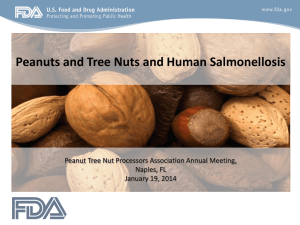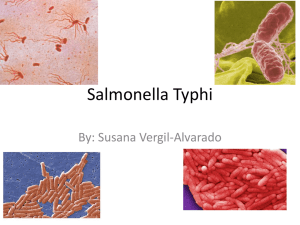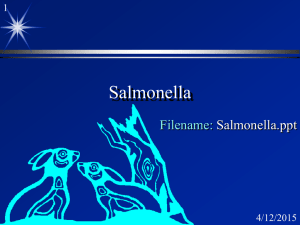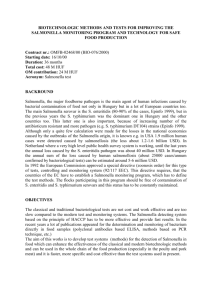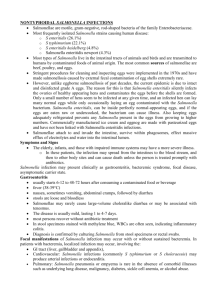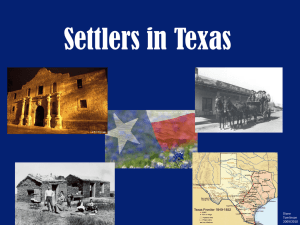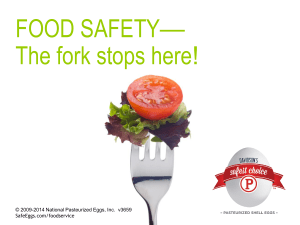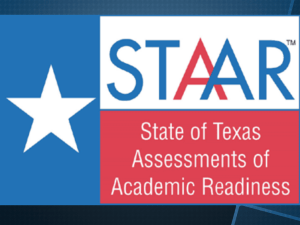Virginia*s Rapid Response Team
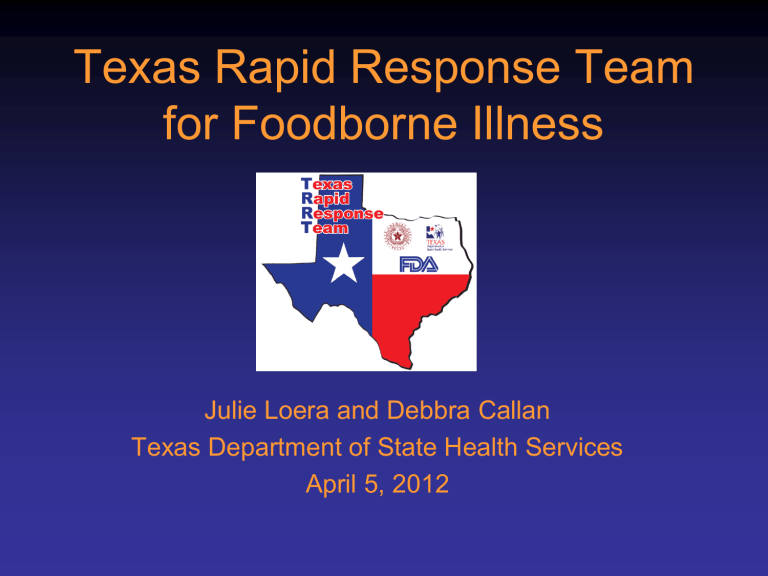
Texas Rapid Response Team for Foodborne Illness
Julie Loera and Debbra Callan
Texas Department of State Health Services
April 5, 2012
Foodborne Illness in the US
Each Year
48 million people (1 in 6)
128,000 Hospitalized
3000 deaths
Source: Centers for Disease Control and Prevention www.cdc.gov
Multi-State Foodborne Illness
Outbreaks -2011
• Ground Beef Salmonella
Typhimurium
• Romaine Lettuce Escherichia coli O157:H7
• Kosher Broiled Chicken Livers
Salmonella Heidelberg
• Turkish Pine Nuts Salmonella
Enteritidis
Jensen Farms Cantaloupes -
Listeria monocytogenes
• Ground Turkey - Salmonella
Heidelberg
Whole, Fresh Imported
Papayas Salmonella Agona
• Alfalfa and Spicy Sprouts –
Salmonella Enteritidis
• Turkey Burgers Salmonella
Hadar
• Lebanon Bologna -
Escherichia coli O157:H7
• Del Monte Cantaloupe -
Salmonella Panama
• Hazelnuts Escherichia coli
O157:H7
Source: Centers for Disease Control and Prevention www.cdc.gov
Notable Past Outbreaks
• 2010
– Shell Eggs Salmonella Enteritidis
• 1939 cases in ~11 states
2009
– Peanut Butter Salmonella Typhimurium
2008
• 714 cases in 46 states
– Raw Produce Salmonella Saintpaul
• 1442 cases in 43 states
Source: Centers for Disease Control and Prevention www.cdc.gov
Takes a Multi-level Team Effort
Federal, State, Local
Epidemiologists
Laboratorians
Environmental
Specialists
Subject Matter
Experts
Regulatory Officials
PFGE – Food CSI
Pulse Field Gel Electrophoresis
Links human cases
Links human cases to food
Links food to a facility (plant or farm) http://www.cdc.gov/pulsenet/
PFGE Results
Source: Texas Department of State Health Services
Laboratory Services
Importance of Solving the Outbreak
Message to consumers
Stop the source
Prevent recurrence
National Rapid Response
Team Concept
• Surveillance, investigation, and response, to alleged food-related incidents and emergencies
• Collection, analysis, and dissemination of information that may prevent recurrence
• Response to all food hazard incidents in the farm to table continuum using ICS
• Operate in conjunction with other food and feed agencies, other state RRTs, FDA district offices, and state emergency response operations centers.
Rapid Response Teams
Currently 9 active teams nationwide
• 6 states piloted in 2008
• 3 additional states added in 2009
9 states coordinate
• Yearly meetings
• Work groups to produce standard documents
Request for proposal open for additional teams
Texas Rapid Response Team (TRRT)
Texas Department of State Health Services
• Infectious Diseases Branch
• Laboratory Services
• Regulatory Division
Office Of the Texas State Chemist
US Food and Drug Administration
• Dallas District Office
• Southwest Import District
• Southwest Regional Office
• Food Emergency Response Network (FERN)
Scope of Team Operations
The purpose of the TRRT is to provide preparedness, prevention, and timely response to food and/or feed related disasters that may affect the citizens of Texas.
The TRRT may respond to large scale investigations involving food and/or feed and large scale recalls of food and/or feed. It is not intended to include a natural disaster
(hurricane, forest fire, etc.). However, there may be outcomes of a natural disaster that require the activation of all or portions of the TRRT under the State of Texas
Emergency Operations Command.
Highlights of the TRRT
• ICS Structure
– Combined Federal/State Team
• Response Operating Guidelines
• Communication Platform – Traction ®
Software
– Allows remote uploading
– Sharing of extensive traceback records
– Ability to pull in other RRT States
T exas
R apid
R esponse
T eam
Incident
Commander
Public
Information
Officer
Safety Officer
Liaison Officer
Agency Representatives
State Agency Directors
FDA District Director
FDA Director/Investigations
FDA Director/Compliance
FDA Director FERN
TDA Emergency Response
Coordinator
Operations
Chief
Planning Chief Logistics Chief Finance Chief
Animal Feed
Branch
Situation Unit
(SMEs)
Service
Support Unit
Human Food
Branch
Documentation
Unit
IT Unit (As needed)
Resource Unit
Texas RRT Response Operating Guide
Table of Contents
I. Authority
II. Purpose & Scope
III. Acronyms and Definitions
IV. Situations and Assumptions
V. Concept of Operations
A. Operations
B. Communications
C. Working with Other Agencies
VI. Document Control
VII. Appendices
A. TRRT Distribution Lists
B. Activation and Deactivation Standard
Operating Procedure
C. Communication Standard Operating
Procedure
Our Long Hard Road – Step 1
Our Long Hard Road – Step 2
Source: Centers for Disease Control and Prevention www.cdc.gov
We’ve Made It Halfway– Step 3
TRRT – Step 4
• ROG - APPENDIX B – Activation/Deactivation
SOP – approved March 2012
– Describes potential triggers for team activation
– Delineates the process for team activation
– Delineates the process for team deactivation
• All Team training and meeting in Austin
November 2011
• Working on Sampling, Training, and Traction ®
SOPs
Next Steps
• Food Emergency Response Plan – Annex O-
Appendix to the State Emergency Response
Plan – in draft
• TRRT Table Top – April 28 th , 2012 – Austin
• Functional Exercise – Fall 2012
• Continue Work on TRRT Standard Operating
Procedures
• Potential National Exercise with all Rapid
Response Teams
Questions??
Contact Information
Julie Loera
512-834-6770 ext 2342 julie.loera@dshs.state.tx.us
Debbra Callan
512-834-6770 ext 2484 debbra.callan@dshs.state.tx.us

